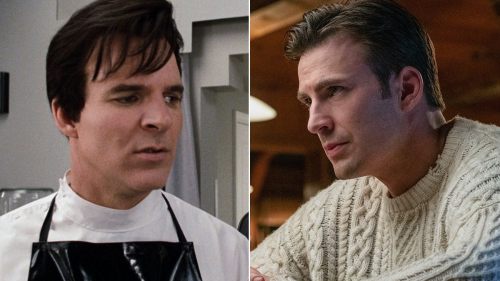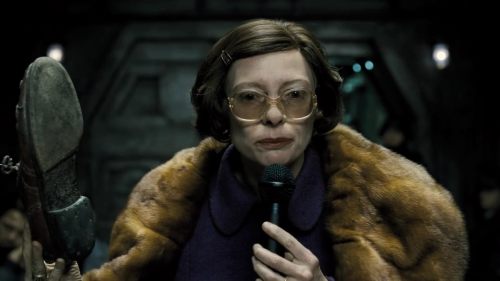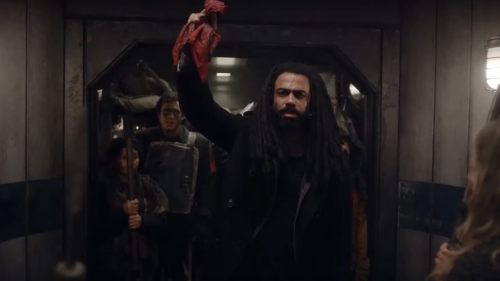SDCC: Talking SNOWPIERCER And Only SNOWPIERCER With Chris Evans
While participating in a likely grueling whirlwind of Marvel business at this year's Comic-Con, Chris Evans made himself available for a brief interview to discuss the full release of his great film, Snowpiercer. There were about fifteen of us in the room, so not all these questions are mine. Just the really really good ones.
How much of Snowpiercer was meant to feel explicitly like a fable and how much of it was supposed to be a more hard edged adult-minded movie? Was it ever discussed as a fable?
I wouldn’t have done the movie if I didn’t have confidence in Bong finding deeper layers than just an interpretation of a graphic novel. That’s what Bong is phenomenal at. In all his movies there’s a lot more than meets the eye. So you trust that Bong has a lot more intentions than just what’s on the surface.
Which one of the train cars was your favorite?
I like the tail section. I think that’s Curtis. That’s who he is. The tail section’s hard, it’s grimy, it’s dirty, it’s rough, it’s gritty. And I had the most fun back there.
Did you have any thoughts about how the VOD release worked out?
You know, I’m just learning about this. The movie has done phenomenally well, but this is all pretty new to me. Being and actor for x amount of years, I certainly don’t concern myself with how things are released or when they are released. This is all brand new. I just directed last year, and there are so many elements of the process like post production and how the film is handled that I’m still learning. It seems like this is a pretty pioneering film in how VOD has been accepted in the market, but it’s the kind of thing that makes you realize how green you are. I couldn’t give my opinion; it wouldn’t be worth it.
Do you have a personal preference on how you’d want to watch the movie?
I absolutely think the movie should be seen on a big screen. But I read something where someone from Radius said “a screen is a screen is a screen,” and there’s a couple different ways to interpret that. Personally, I like going to movies. I like buying my ticket and sitting in a theater. And I guess that’s still available, but it would be a shame if all the sudden you lost that opportunity. I hope it doesn’t tip the scales too far. But by the same token, a lot of people contact me and tell me they saw the movie not in a theater but still had positive things to say. So it’s a grey area in terms of “what’s the best way to do this? What's it worth?”
One of my favorite scenes was the night vision battle. It looked incredibly complex to make. Can you talk a bit about how you did that?
It was hairy. We had some great stuntmen and great stunt coordinators, and it’s a really messy scene. A lot of it is actually far more choreographed than you would expect. You really know what you’re doing and each mark that you’re hitting. But it’s a sloppy fight, and it’s supposed to look messy. It’s a train fight so it’s supposed to look a little unorganized. I think they did a really good job of accomplishing that. It actually really is kind of like a dance.
In that fight scene, you slip on a fish. It’s my favorite moment in the movie, but it seems so out of place in an American styled movie. Were there discussions about that making sense? Was that one of the things the Weinsteins were uncomfortable with?
There may not have been a discussion, but I was thinking it. That’s the thing about this whole movie. There were so many parts of this movie where you’re just like “What? What is going on?” When they bring the fish out and cut it, you’re like “What are they doing?” But it’s what makes this movie so cool. It really is so out of left field and so unique. The script itself, you read it and question whether things will make sense. But there’s a trust that you have to have with certain filmmakers and storytellers, where you just know they have an artistic eye. You just know it will make sense to a willing audience. So a lot of times you hand over your trust to the director.
What were some of those moments where you were reading the script and thought “What the heck?”
All of them. One of the big problems I had at the beginning of the movie was I wanted more explanation. How did this happen? I just wanted more info. What was the experience? Where was this train when the Earth froze? Was the train in one spot? Did everyone clamber on at once? My rational mind wanted more clarity. But you bring these things up to Bong, and it almost kind of felt to him like that stuff’s not necessary. He saw a bigger picture. He saw something broader, something more beautiful and artistic than my mind could grasp on paper. And ultimately it did make sense.
As a director are there any lessons you feel you learned from your experience working on Snowpiercer?
Bong does things very differently as a director. Typically when you’re shooting a scene, if this were a scene, you would shoot in a master and you would get us together in a two-shot. Then you would do the whole scene on your single and then the whole scene on my single. And we would have a lot of options in the editing room to cut the scene together as you choose. Bong will shoot the edit in his mind. If he saw the scene between you and me, if he saw the first three lines in a two-shot and the next two lines were on you and the next two lines are on me, that’s what he would shoot. There are days where there’s plenty of lines of dialog I have in the movie that are not on film. There is no footage of my saying certain pieces of dialog. It’s the most bold, terrifying thing I’ve ever seen any director do. But it obviously worked out. I will never be that confident, but it worked out. It’s one of those amazing things that you can do when you’re that powerful a filmmaker.
Your big, emotional speech at the end of the film is so good. When you read that as an actor and you know you’re going to have to execute that, is it terrifying or exciting?
It’s terrifying because movies are a collaboration, and you give a performance but you hand your performance over. And I’ve seen a lot of times where you do certain things in movies, and you see the final product, and it may not be what you want it to be. It’s only scary if you don’t trust your director. If you trust your director, it’s beyond exciting. There is a beautiful cradle that a good director can provide to let you explore and take risks. If you don’t trust your director, it really handicaps your risks. You maybe try to stick with what you think is safe. With Bong there were a lot of different takes where we would try a lot of different things, and you just feel confident it’s going to work out in the end.



